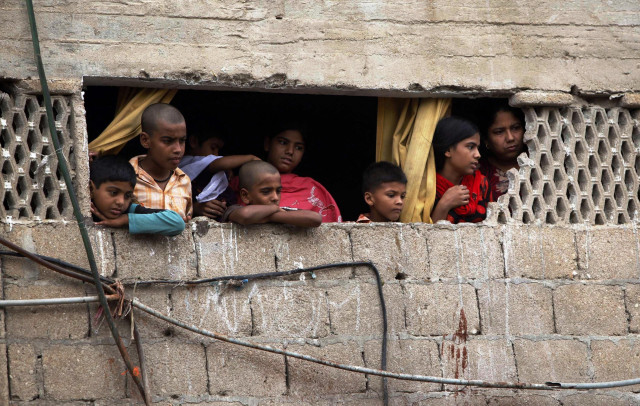Military cantonments and government officers’ residences are a familiar site across the length and breadth of Pakistan. Well-planned, organised, serene and secure are some qualities that come to mind when they are mentioned.
Equally familiar are squatter settlements, housing millions across the country. Their presence does not only highlight serious flaws in (neo-liberal) development practices followed by successive governments, it also signifies a disconnect between the state and the people.
The two major expenditures in the budget, after accounting for debt servicing, are military and development funding. While the former is inherently non-productive, the latter too is futile for the millions of ‘slumdogs’. The focus of the PSDPs, guided by the blind-to-grassroot-needs interests of foreign investment, is profitable projects: overhead bridges, motorways, high rises, mass transit rails, huge dams, etc. Ironically, the first victims of these ‘development’ projects are squatter settlers. Thousands have been evicted in Lahore alone to make way for the motorway bypass and the much-touted Ring Road.
Squatter settlements are encroachments in official terminology, meaning thereby that settlers can seek no remedy under the law. Most of the land on which these settlements have emerged is owned by the defence department, Auqaf, railways, Evacuee Trust Property Board and local governments. States considering emigrants illegal somehow makes sense, but it declaring its own citizens illegal occupants is incomprehensible.
These ‘illegal’ settlers are not characterised by being Punjabi, Sindhi, Pakhtun or Baloch. Rather, what defines them is their disenfranchised status. They lack housing, sanitation, public utilities such as electricity, gas, schooling, healthcare, adequate nutrition, etc.
The only relief they have, however inconsequential, is through political struggle. The Katchchi Abadis Act being the biggest victory to date, under which the government has handed ownership rights to inhabitants of some of the settlements.
With the threat of evictions looming large over their heads, security – the buzzword that has made the military an absolute must – holds zero value. The state of Pakistan urgently needs to provide a new social contract to its people. A Hobsian pact that has barely been guaranteeing security vis-a-vis external enemies can no longer work. The have-nots need more than a strong military, an independent judiciary and an elected parliament.



COMMENTS
Comments are moderated and generally will be posted if they are on-topic and not abusive.
For more information, please see our Comments FAQ